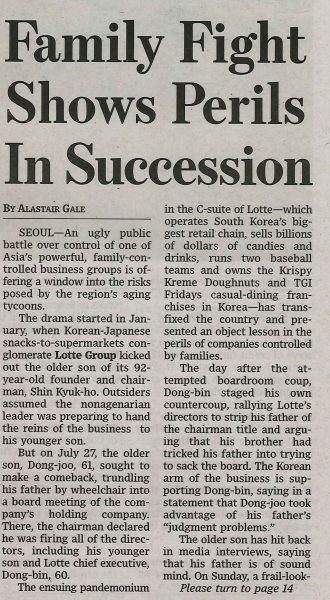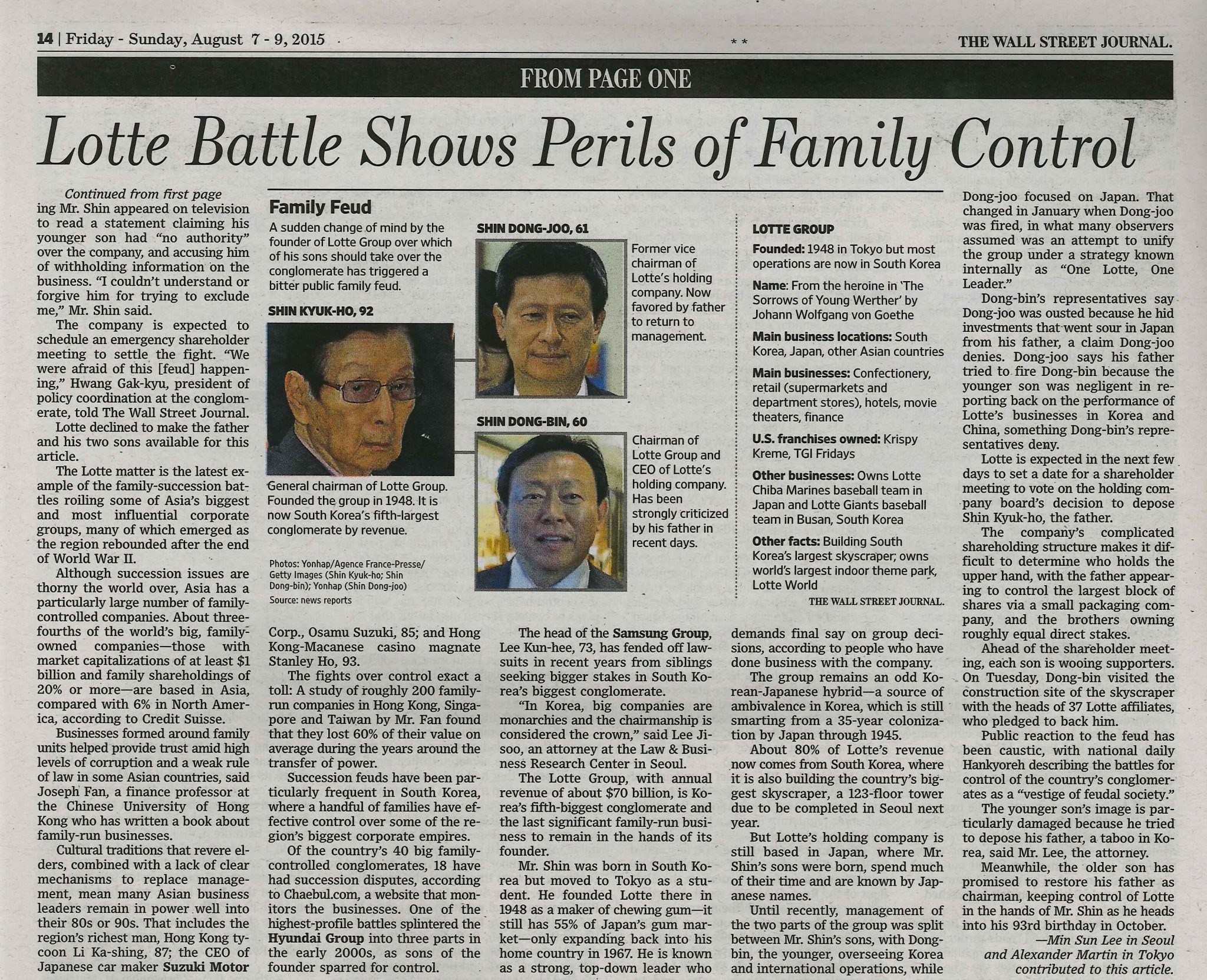Power Struggle at Korean Firm Lotte Shows Perils of Succession

Commenting on the recent family-succession peril surrounding The Lotte Group, Prof. Joseph Fan told The Wall Street Journal in an interview that businesses formed around family units help provide trust amid high levels of corruption and a weak rule of law in some Asian countries.
In January 2015, Korean-Japanese snacks-to-supermarkets conglomerate Lotte Group kicked out the older son of its 92-year-old founder and chairman, Shin Kyuk-ho. Outsiders had assumed the nonagenarian leader was preparing to hand the reins of the business to his younger son.
But on July 27, the older son, Dong-joo, 61, made a surprise comeback, trundling his father by wheelchair into a board meeting of Lotte’s holding company. There, Shin Kyuk-ho declared he was firing all of Lotte’s holding company’s six directors, including his younger son and Lotte chief executive, Dong-bin, 60.
The Lotte clash is the latest example of the family-succession battles roiling many of the corporations that grew into regional and global giants as the region rebounded following the end of World War II. Although succession issues are thorny the world over, Asia has a particularly large number of family-controlled companies. According to a recent study by Credit Suisse, around three-fourths of the world’s big, family-owned companies—those with market capitalisations of at least US$1 billion and family shareholdings of 20 percent or more—are based in Asia, compared with 6 percent in North America.
Joseph Fan, Professor of School of Accountancy and Department of Finance and Co-director of Centre for Economics and Finance at The Chinese University of Hong Kong Business School, says in an interview with The Wall Street Journal that businesses formed around family units have helped provide trust amid high levels of corruption and a weak rule of law in some Asian countries.
Succession feuds have been particularly frequent and damaging in South Korea, where a handful of families have effective control over some of the region’s biggest corporate empires. Cultural traditions that revere elders, combined with a lack of clear mechanisms to replace management, mean many Asian business leaders remain in power well into their 80s or 90s. The fights over control exact a toll: A study of around 200 family-run companies in Hong Kong, Singapore and Taiwan show that these companies lost an average of 60 percent of their value during the years around the transfer of power, according to findings from the book “The Family Business Map: Assets and Roadblocks in Long Term Planning,” co-authoured by Prof. Fan.
The Lotte Group, with annual revenue of about US$70 billion, is Korea’s fifth-biggest conglomerate and the last significant family-run business to remain in the hands of its founder. About 80 percent of Lotte’s revenue now comes from South Korea. However, the group remains an odd Korean-Japanese hybrid—a source of ambivalence in Korea, which is still smarting from a 35-year colonisation by Japan through 1945.
Lotte’s holding company is still based in Japan, where Mr. Shin’s sons were born, spend much of their time and are known by Japanese names. Until recently, management of the two parts of the group was split between Mr. Shin’s sons, with Dong-bin, the younger, overseeing Korea and international operations, while Dong-joo focuses on Japan. That changed in January when Dong-joo was fired, in what most observers assumed was an attempt to unify the group under a strategy known internally as “One Lotte, One Leader.”… Read More (PDF)
This story was published in both the print and online editions of The Wall Street Journal / Dow Jones Newswire. Please click the images below to view the print coverage.
For more information about Prof. Joseph Fan’s book, “The Family Business Map: Assets and Roadblocks in Long Term Planning,” please click here.
Source: The Wall Street Journal / Dow Jones Newswire
Date published: 7 August, 2015
Photo: Yonhap/Agence France-Presse/Getty Images



